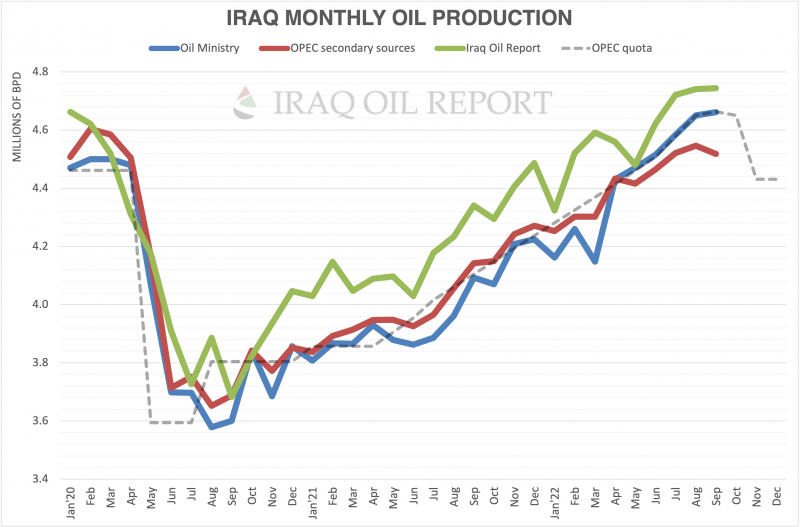sponsored by:
 Welcome to This Week in Iraq, your one-stop source for all of the most important news on Iraq's energy sector, political developments, security dynamics, and investment climate, curated by the editors of Iraq Oil Report and sponsored by the Iraq Britain Business Council. To sign up and receive this free newsletter in your inbox every week click here. Top Energy StoriesIraq’s nationwide oil production held steady in August and September at 4.74 million barrels per day (bpd), according to field-by-field data compiled by Iraq Oil Report. Output has topped 4.7 million bpd for three months in a row, which will likely be the high-water mark for the year. The government is coming under pressure to reduce output following an OPEC-plus decision to take 2 million bpd off the market starting in November, including a quota reduction of 220,000 bpd for Iraq. It remains unclear to what extent Iraq will actually cut production, or whether the federal government might try to shift responsibility for some cuts onto the semi-autonomous Kurdistan Regional Government (KRG), which manages its oil sector independently of Baghdad. In previous eras of steep OPEC cuts, the Oil Ministry has sometimes appeared to over-report KRG production to defray blame for failing to adhere fully to quota expectations. Read the full story on Iraq Oil Report. 
Rockets again struck near the Khor Mor gas field, but operations were not affected. Ali Sultan and Ahmed Rasheed report for Reuters: At least eight Katyusha rockets were fired at the Khor Mor gas field in Iraq's Kurdistan region on Wednesday, but the attack did not result in casualties or affect the operations, sources said. ... “The attack didn’t result in any casualties, and operation is normal within the field. Investigations are ongoing by security forces at the moment,” Lawk Ghafuri, Head of Foreign Media Affairs for the Kurdistan regional government said on Twitter. A local commander from Hashid Shaabi, a state-run umbrella that includes Shi’ite militias, said they found a rocket launcher with a timer fixed on top of a mini-truck in a rural area around 20 km (15 miles) to the southwest of Khor Mor.
Where To Find Business Opportunities in IraqA message from the Iraq Britain Business Council (IBBC): There is no better place to build your network in Iraq than the IBBC conference in Dubai. On Nov. 10 and 11, business and government leaders will gather for sessions on finance, hydrocarbons and the energy transition, industry and trade, and the promotion of the private sector and tech. New this year, there's also a day devoted to business opportunities in Basra: oil and gas, utilities, environmental projects, agriculture, and food distribution and processing. Attendees will include:
- the governor of the Central Bank of Iraq
- the chairman of the KRG Investment Board
- other top Cabinet officials and DGs to be announced
Click here to get more details and to register.
National NewsIraq has a new president and prime minister designate. Al-Monitor reports: In Iraq's informal power-sharing tradition, the president must be Kurdish and the prime minister Shiite. As a part of a deal between the Kurds and Shiites, a prominent Kurdish figure, Abdul Latif Rashid, was nominated as a compromise candidate for the presidency. Former President Barham Salih had remained as a candidate for reelection. In the first round, neither candidate earned the required 220 votes. In the second round, when only a simple majority is required, Rashid won the position with 162 votes against Salih's 99. Rashid, an Iraqi Kurd from the city of Sulaymaniyah born in 1944, is affiliated with the Patriotic Union of Kurdistan. He served as minister of water resources from 2003-2010, and became a presidential advisor in 2010. In 2018, he ran for the presidency but lost to Salih. ... Immediately after being chosen, Rashid designated Muhammad Shia al-Sudani for the position of prime minister. Sudani was the Coordination Framework's proposed candidate for the post. At the beginning of today's session, the Coordination Framework declared themselves the largest bloc and nominated Sudani for the post. Sudani now has one month to form a government and come to the parliament to obtain a vote of confidence.
Sadr will not join the new government. The National reports: The Iraqi political bloc led by influential Shiite cleric Moqtada Al Sadr said on Saturday that it would not join a new government being formed by prime minister-designate Mohammed Shia Al Sudani. ... "We stress our firm and clear refusal for any of our affiliates to participate ... in this government formation," Mohammed Saleh Al Iraqi, a close associate of Mr Al Sadr, said in a statement posted on Twitter. ... In his statement on Saturday, Mr Al Iraqi claimed that the incoming government would have a "clear subordination to militias" and would "not meet the [Iraqi] people's aspirations." He said the Sadrist movement refused to take part in any government led by Mr Al Sudani "or any other candidate from among the old faces or those affiliated with the corrupt.... Anyone who joins their ministries does not represent us... rather, we disavow them."
|